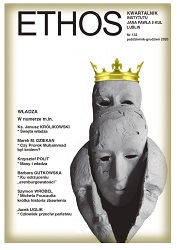Władza, przywództwo i siła polityczna w amerykańskim ruchu syjonistycznym w latach 1914-1920. W stulecie ustanowienia Brytyjskiego Mandatu Palestyny
Power, Leadership and Political Force in the American Zionist Movement, 1914–1920: On the Centenary of the Establishment of the British Mandate of Palestine
Author(s): Bożenna ChylińskaSubject(s): Jewish studies, Diplomatic history, History of ideas, Political history, Pre-WW I & WW I (1900 -1919)
Published by: Katolicki Uniwersytet Lubelski Jana Pawła II - Instytut Jana Pawła II, Wydział Filozofii
Keywords: American Zionism; Palestine; Brandeis; Weizmann; Balfour Declaration; San Remo Conference; British Mandate of Palestine;
Summary/Abstract: World War I marked the beginning of a significant role of American Jewry in global affairs. Both the emergence of the United States as the new world power and the financial status of the Jewish American community contributed to a considerable participation of American Jews in the councils of world Jewry. The war and its aftermath brought fundamental changes to the Zionist movement, which offered the pragmatic approach to the actual problems of Diaspora Jews. There appeared both the necessity and possibility for uniting all the American Zionist factions into a powerful organization with an effi cient party apparatus and prominent leadership which revitalized the Zionist movement and made it responsive to its main aim, i.e., the establishment of the Jewish Homeland in Palestine. Louis D. Brandeis’s leadership marked a turning point in the history of American Zionism through a combination of his potent personality with a coherent ideology that reflected the American conditions. All those developments helped create the most powerful American Zionist organization in the world, with the sole aim to effectually implement the idea of a home for the Jewish people. The Americanization of Zionism, based on practical work in building up Palestine, was a direct reason for a bitter conflict between Brandeis and Weizmann, the leader of European Zionism, that is between fostering Jewish settlement in Palestine through a systematic and methodical economic process on the one hand, and through implementing a synthesis of socio-ethical and cultural values that Zionism in Weizmann’s view should represent, on the other. The article discusses the circumstances which triggered the American Zionist movement to assume power, prestige, and large following; it also analyzes the reasons for an orchestrated and determined diplomatic action on the part of both the Zionist Organization of America and the World Zionist Organization to articulate and achieve their direct aim first through the Balfour Declaration and then through the San Remo Conference decision of entrusting the Mandate over Palestine to Great Britain. They both proved to have been the indispensable prerequisites for the establishment of the Jewish State in Palestine.
Journal: Ethos. Kwartalnik Instytutu Jana Pawła II KUL
- Issue Year: 33/2020
- Issue No: 4
- Page Range: 249-273
- Page Count: 25
- Language: Polish
- Content File-PDF

